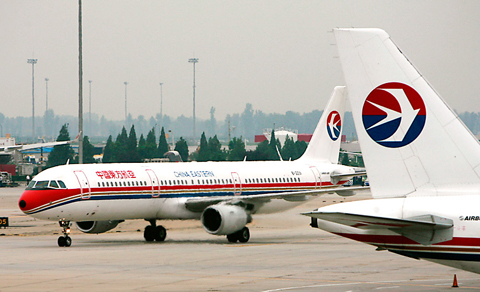China Eastern Airlines (中國東方航空) said yesterday it had received a government injection of 2 billion yuan (US$290 million) to overcome difficulties amid the financial crisis.
The money will reduce the financial strain faced by China’s third-largest carrier, Liu Jiangbo (劉江波), a vice president of the parent company China Eastern Air Holding Co, said in a statement.
“China Eastern has recently received an injection of 2 billion yuan from the state,” Liu said.

PHOTO: AFP
“Operations have maintained good momentum due to various reform measures and have improved from late last year,” he said.
The latest capital injection brings the total amount of government aid awarded to the airline in the past six months to 9 billion yuan.
China Eastern suffered a net loss of 15.3 billion yuan last year because of falling passenger numbers, rising fuel costs and bad bets on fuel hedging contracts.
China Eastern said last week it was selling two Airbus A340 jets for 590 million yuan to improve its cash flow.
The Shanghai-based airline said in a statement its net profit for the first three months of the year totaled 40.1 million yuan, down 81 percent from 210.8 million a year earlier.
The carrier said revaluation gains of 422.0 million yuan in its fuel hedging contracts for the first quarter on higher international oil prices help offset losses from weak travel demand.
China Eastern and its bigger rivals, China Southern Airlines (中國南方航空公司) and Air China (中國國際航空), met strong headwinds last year as a slew of natural disasters and a slowing economy hit air travel.
Passenger demand has recovered thanks to Beijing’s aggressive efforts to prop up economic growth, with volumes up 14.6 percent in the first quarter, according to the Civil Aviation Administration of China.
But analysts said improved passenger numbers and the latest cash injection were unlikely to improve China Eastern’s overall financial position given its massive debt, which exceeded its total assets by ten billion yuan at the end of March.
“It will lower its financial [debt-related] expenses but the impact is likely to be minimal for such a big company,” said Huang Jinxiang, a Beijing-based analyst with Guosen Securities.
“Even if it managed to be profitable this year, it would be insufficient to lower its debt ratio significantly,” he said.
The outlook for China Eastern and the whole aviation industry this year is now highly dependent on severity of the A(H1N1) flu epidemic, which would weakened air travel, Huang said.
“They would have swung back into profit had it not been for the flu fears,” he said.

Right-wing political scientist Laura Fernandez on Sunday won Costa Rica’s presidential election by a landslide, after promising to crack down on rising violence linked to the cocaine trade. Fernandez’s nearest rival, economist Alvaro Ramos, conceded defeat as results showed the ruling party far exceeding the threshold of 40 percent needed to avoid a runoff. With 94 percent of polling stations counted, the political heir of outgoing Costa Rican President Rodrigo Chaves had captured 48.3 percent of the vote compared with Ramos’ 33.4 percent, the Supreme Electoral Tribunal said. As soon as the first results were announced, members of Fernandez’s Sovereign People’s Party

EMERGING FIELDS: The Chinese president said that the two countries would explore cooperation in green technology, the digital economy and artificial intelligence Chinese President Xi Jinping (習近平) yesterday called for an “equal and orderly multipolar world” in the face of “unilateral bullying,” in an apparent jab at the US. Xi was speaking during talks in Beijing with Uruguayan President Yamandu Orsi, the first South American leader to visit China since US special forces captured then-Venezuelan president Nicolas Maduro last month — an operation that Beijing condemned as a violation of sovereignty. Orsi follows a slew of leaders to have visited China seeking to boost ties with the world’s second-largest economy to hedge against US President Donald Trump’s increasingly unpredictable administration. “The international situation is fraught

MORE RESPONSIBILITY: Draftees would be expected to fight alongside professional soldiers, likely requiring the transformation of some training brigades into combat units The armed forces are to start incorporating new conscripts into combined arms brigades this year to enhance combat readiness, the Executive Yuan’s latest policy report said. The new policy would affect Taiwanese men entering the military for their compulsory service, which was extended to one year under reforms by then-president Tsai Ing-wen (蔡英文) in 2022. The conscripts would be trained to operate machine guns, uncrewed aerial vehicles, anti-tank guided missile launchers and Stinger air defense systems, the report said, adding that the basic training would be lengthened to eight weeks. After basic training, conscripts would be sorted into infantry battalions that would take

GROWING AMBITIONS: The scale and tempo of the operations show that the Strait has become the core theater for China to expand its security interests, the report said Chinese military aircraft incursions around Taiwan have surged nearly 15-fold over the past five years, according to a report released yesterday by the Democratic Progressive Party’s (DPP) Department of China Affairs. Sorties in the Taiwan Strait were previously irregular, totaling 380 in 2020, but have since evolved into routine operations, the report showed. “This demonstrates that the Taiwan Strait has become both the starting point and testing ground for Beijing’s expansionist ambitions,” it said. Driven by military expansionism, China is systematically pursuing actions aimed at altering the regional “status quo,” the department said, adding that Taiwan represents the most critical link in China’s